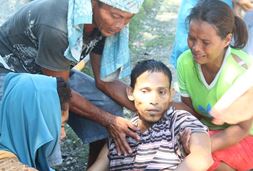PHILIPPINES: Killing the ideals of dissent & free speech – two more killed, one wounded in attacks

Human Rights Report for 2013:
‘License’ to torture, kill and to silence the oppressed
http://www.humanrights.asia/resources/hrreport/2013/AHRC-SPR-001-2013.pdf/
On December 9, the Asian Human Rights Commission (AHRC) has expressed its deep concern over the renewed targeted attacks of journalists and activists. In the space of one week, five journalists and activists, known critics against corruption, wrong doings of local politicians, extrajudicial killings, and so on, have been killed. These killings were done in broad daylight and in crowded places displaying a blatant disregard for the rule of law and most definitely to send a message to the public – such dissent will not be tolerated!
The AHRC has now learnt of two more persons being killed and another wounded. Those killed were: a broadcast journalist critical of local politics and a poor and ordinary villager trying to protect his son and their home from being demolished by armed policemen. The one wounded was another broadcast journalist. The names and reasons for why they were attacked are as follows:
 On December 4, Nexon Togao, a poor and ordinary villager, was killed when policemen shot at him as he was trying to save his son who fainted from inhaling tear gas. He was struck in a kidney and the groin.
On December 4, Nexon Togao, a poor and ordinary villager, was killed when policemen shot at him as he was trying to save his son who fainted from inhaling tear gas. He was struck in a kidney and the groin.
Nexon Togao is seen in this photo hours before he died. Photo: Task Force Lugait
Nexon and other villagers were trying to prevent the demolition of their homes. A court sheriff and a demolition team, including policemen who were carrying loaded weapons arrived unannounced in Lugait, Misamis Oriental, to demolish the homes of the informal settlers. The police also allegedly hog-tied several women protestors at the height of the scuffle.
In separate incidents, a broadcast journalist was killed and another was also wounded in shootings. On December 10, Jonavin “Jhey-R” Villalba, (43), a reporter of radio station dyOK Aksyon Radyo in Iloilo, survived an attempt on his life. But on December 11, Rogelio “Tata” Butalid of Radyo Natin, was killed in front his radio station in Tagum City. Rogelio received threats to his life before he was murdered.
These renewed attacks, once again, clearly demonstrates the absence of adequate and effective protection from state agents, and persons or groups working for them. The government expresses its condolences to the victim’s families and ‘demonstrates’ its ‘political will’ to ensure justice, but beyond that nothing happens. The perpetrators still kill, in broad daylight without fear of punishment; and their victims, still fear for their lives without any sort of protection.
Clearly, there is a pattern of the systematic, widespread and routine inability of the government to protect persons whose lives are threatened; as in the case of Rogelio and Jonavin. The government appears to be doing nothing to prevent the loss of lives and use of excessive force on poor villagers defending their dwellings, like in the case of Nexon and others. The government’s, present and its past administration, are fully aware of this trend. However, why it has done nothing to halt these targeted attacks remains the question. If the government is and was in control of this situation, they must be asked: what is wrong and what went wrong?
While we express our concern on the lack of, if not the absence of punishment, or any sort of remedy for the victims and their families, we are more deeply concerned that the space to express dissent and to assert one’s fundamental rights and one’s freedom to express his opinion on matters of public interest, is becoming narrower with the passing of each day.
The AHRC is of the opinion that, in addition to killings people, to kill persons and to systematically target those embodying the ideals of dissent are causing far deeper damage to Filipino society. With these killings the attackers are not only killing the physical bodies of their victims but also the ideals they hold dear more than their own lives. These continued attacks and the government’s inability to protect them perpetuates this.
Furthermore, we strongly urged the government of the Philippines and its justice institutions, the public and those who still value the ideals of those who were killed and those who continue to assert and fight at the risk of their lives for this ideal, to speak out in condemning these targeted attacks. In a society where killing people in broad daylight has become commonplace it must be realised that ‘bodies’ may inevitably die, but the ideals they embody must and will continue to live.
To support this case, please click here: SEND APPEAL LETTER



